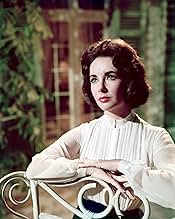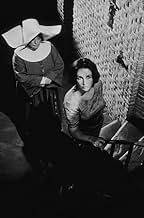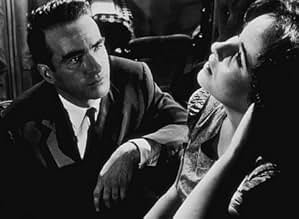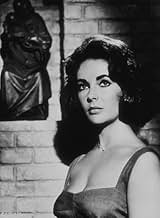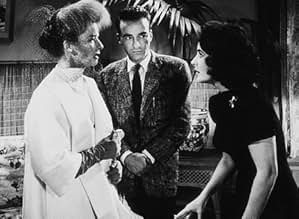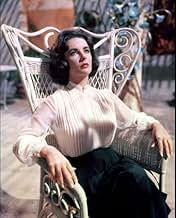IMDb RATING
7.5/10
18K
YOUR RATING
A surgeon is assigned the case of a young woman whose aunt wants her lobotomized to cover up a family secret.A surgeon is assigned the case of a young woman whose aunt wants her lobotomized to cover up a family secret.A surgeon is assigned the case of a young woman whose aunt wants her lobotomized to cover up a family secret.
- Nominated for 3 Oscars
- 4 wins & 7 nominations total
Sheila Robins
- Dr. Hockstader's Secretary
- (as Sheila Robbins)
Erik Chitty
- Asylum Inmate
- (uncredited)
Grace Denbeigh-Russell
- Asylum patient
- (uncredited)
Brenda Dunrich
- Nurse
- (uncredited)
Eddie Fisher
- Street Urchin
- (uncredited)
Anthony Lang
- Inmate
- (uncredited)
Aileen Lewis
- Nurse
- (uncredited)
Featured reviews
10robb_772
Long-fabled as one of the most bizarre films to come out Hollywood during the years of the Production Code's strict enforcement, SUDDENLY, LAST SUMMER is a riveting psychological drama that remains absolutely gut-wrenching even after nearly fifty years since it's original release. Screenwriter Gore Vidal takes Tennessee Williams' one-act play and runs with it, fleshing out the central characters and expanding the story's central arc. Vidal had the seemingly impossibly task of taking a tale involving homosexuality, incest, pedophilia, and even cannibalism and presenting it all in a manner that would be acceptable to the rigid Production Code, yet still coherent to the average film audience. Not only did Vidal succeed victoriously, but the slightly ambiguous nature of the film's climax and denouncement actually makes the twice as unsettling and disturbing.
With relatively few characters to populate the story the performances are absolutely crucial, and the tight-knit cast delivers the goods in spades. Long after many of her acting contemporaries of the thirties and forties had been forgotten, Katharine Hepburn continued to reign supreme on the silver screen and her sublime performance as the manipulative and cunning Mrs. Venable ranks among Hepburn's best work of the decade. The wounded vulnerability of a post-car accident Montgomery Clift serves him well in a difficult role as the middle man between the film's leading ladies, and the still-handsome actor provides a humane, completely genuine performance that supplies viewers with level-headed window into the off-kilter story. Albert Dekker, Mercedes McCambridge and Gary Raymond also excel in minor roles.
The film's biggest surprise, however, is the exceptional portrayal of Elizabeth Taylor in the film's central performance. Although usually somewhat of an uneven actress, Taylor completely nails a dauntingly difficult role in a complex, multilayered performance that deservedly won her a Golden Globe Award as well as her third consecutive Oscar nomination. During the film's climatic revelation, Taylor lets out a series of bone-chilling screams that I could never imagine coming out of any other actress. Not only does it remain Taylor's finest performance (which is a considerable achievement when one considers that WHO'S AFRAID OF VIRGINIA WOOLF is also on her resume), but it is also a performance that simply could not be bettered.
Although perhaps he could never surpass 1949's A LETTER TO THREE WIVES or 1950's ALL ABOUT EVE in the eyes of most viewers, SUMMER contains some of the finest work of director Joseph L. Mankiewicz' legendary career. Brilliantly combining southern Gothicism with straight-faced psychodrama and even grandiose horror, Mankiewicz stitches the various seemingly disparate threads together in a harrowing, yet perversely satisfying whole. Even the lengthy, sometimes criticized flashback sequence is an absolute tour de force of film-making that leaves viewers emotionally exhausted as one experiences the on screen turmoil more than simply watching it. An often unheralded classic, the film remains of the most sorely underrated films of its era.
With relatively few characters to populate the story the performances are absolutely crucial, and the tight-knit cast delivers the goods in spades. Long after many of her acting contemporaries of the thirties and forties had been forgotten, Katharine Hepburn continued to reign supreme on the silver screen and her sublime performance as the manipulative and cunning Mrs. Venable ranks among Hepburn's best work of the decade. The wounded vulnerability of a post-car accident Montgomery Clift serves him well in a difficult role as the middle man between the film's leading ladies, and the still-handsome actor provides a humane, completely genuine performance that supplies viewers with level-headed window into the off-kilter story. Albert Dekker, Mercedes McCambridge and Gary Raymond also excel in minor roles.
The film's biggest surprise, however, is the exceptional portrayal of Elizabeth Taylor in the film's central performance. Although usually somewhat of an uneven actress, Taylor completely nails a dauntingly difficult role in a complex, multilayered performance that deservedly won her a Golden Globe Award as well as her third consecutive Oscar nomination. During the film's climatic revelation, Taylor lets out a series of bone-chilling screams that I could never imagine coming out of any other actress. Not only does it remain Taylor's finest performance (which is a considerable achievement when one considers that WHO'S AFRAID OF VIRGINIA WOOLF is also on her resume), but it is also a performance that simply could not be bettered.
Although perhaps he could never surpass 1949's A LETTER TO THREE WIVES or 1950's ALL ABOUT EVE in the eyes of most viewers, SUMMER contains some of the finest work of director Joseph L. Mankiewicz' legendary career. Brilliantly combining southern Gothicism with straight-faced psychodrama and even grandiose horror, Mankiewicz stitches the various seemingly disparate threads together in a harrowing, yet perversely satisfying whole. Even the lengthy, sometimes criticized flashback sequence is an absolute tour de force of film-making that leaves viewers emotionally exhausted as one experiences the on screen turmoil more than simply watching it. An often unheralded classic, the film remains of the most sorely underrated films of its era.
While the symbolism here is about as heavy as a sledgehammer, it's offered in such artfully poetic style that only writers of the caliber of Tennessee Williams and Gore Vidal could give us. What they have done is provide KATHARINE HEPBURN with a role that fits her like a glove and where her mannered acting sits comfortably on a role she was born to play. She is totally mesmerizing as Mrs. Venable, a woman who has lavished all her hopes and dreams on her only son only to have them all swept away on a brutal summer day, "suddenly, last summer", under the hot Mediteranean sun. She gets to spout the most poetic dialog in the film, with ELIZABETH TAYLOR not far behind, especially during their frequent monologues.
This leaves MONTGOMERY CLIFT, as a surgeon who is asked to perform a lobotomy on Miss Taylor, hovering in the background and looking like a frightened sparrow most of the time, although it is he who uncovers the truth about last summer. Mr. Clift must have been at a difficult phase of his own personal life because he performs in a stiff, robot-like manner that makes him seem dubious as a skilled surgeon with steady hands.
All of this is highly melodramatic as only Tennessee Williams can muster, while at the same time affording us the luxury of watching two commanding performances from Hepburn and Taylor that were justifiably nominated for Oscars.
The tale seems burdened by too much heavy-handed poetry but somehow it holds the attention because of the forceful acting by a fine cast. Mercedes McCambridge is a standout as Taylor's mother in the sort of fluttery, birdbrain role one might suspect would be offered to Billie Burke if this had been filmed in the 1940s.
By the end of the film, Miss Hepburn is so far removed from reality that she thinks Dr. Sugar (Montgomery Clift) is her son Sebastian and seems more like a candidate for lobotomy than the plucky Miss Taylor. Taylor never quite has the air of vulnerability that the role demands, but she gives a colorful, if strident, performance as the poor victimized girl who was used as bait by her playboy cousin.
This leaves MONTGOMERY CLIFT, as a surgeon who is asked to perform a lobotomy on Miss Taylor, hovering in the background and looking like a frightened sparrow most of the time, although it is he who uncovers the truth about last summer. Mr. Clift must have been at a difficult phase of his own personal life because he performs in a stiff, robot-like manner that makes him seem dubious as a skilled surgeon with steady hands.
All of this is highly melodramatic as only Tennessee Williams can muster, while at the same time affording us the luxury of watching two commanding performances from Hepburn and Taylor that were justifiably nominated for Oscars.
The tale seems burdened by too much heavy-handed poetry but somehow it holds the attention because of the forceful acting by a fine cast. Mercedes McCambridge is a standout as Taylor's mother in the sort of fluttery, birdbrain role one might suspect would be offered to Billie Burke if this had been filmed in the 1940s.
By the end of the film, Miss Hepburn is so far removed from reality that she thinks Dr. Sugar (Montgomery Clift) is her son Sebastian and seems more like a candidate for lobotomy than the plucky Miss Taylor. Taylor never quite has the air of vulnerability that the role demands, but she gives a colorful, if strident, performance as the poor victimized girl who was used as bait by her playboy cousin.
This screen version, by Joseph L Mankiewicz, of Tennessee Williams' play isn't as highly thought of as it should be. It's not a classic and on occasions it comes over as crude and stilted, but it also has many fine things going for it. Although he never really opens it out, Mankiewicz gives it a fluency that isn't at all theatrical and although he often films scenes intimately and between only two characters, he ensures it is photographed and cut in a very cinematic fashion.
Unfortunately, one of the two people on screen during these 'cinematic' sequences is Montgomery Clift who is at his worst here. It was after his accident and he looks as if he's in pain. When he walks it's as if there is a board up his back and he talks as if out of the side of his mouth. Luckily, with him in these scenes is either Elizabeth Taylor or Katharine Hepburn or both and when they are on screen you don't pay too much attention to Clift.
Dilys Powell said Elizabeth Taylor was born to play Tennessee Williams and she was right. Indeed this may be her best performance after "Virginia Woolf". Catherine's lines don't have the kind of poetry in them that Violet Venable's does but Taylor finds a poetry of her own in her readings. She builds on her long speech at the end and is very moving, even if Mankiewicz can't resist 'showing' us, in flashbacks, what Taylor is telling us, as if he doesn't trust an audience to sit still and just listen to Taylor. (They would have to in the theatre).
As Violet, Hepburn has the showier part and she milks it for all it's worth. It's a great piece of acting because Violet never seems to be acting, though she tends to think of her life as a kind of performance, something she has passed on to her homosexual son, Sebastian. (If the old adage, 'my mother made me a homosexual', has any validity you don't have to look any further than here). She enters from above, descending in her small baroque lift, and Hepburn can see the comic potential in such an entrance. Moments later, however, she is recounting how the sea-turtles were devoured by flesh-eating birds in the Galapogos, and you can see just how dangerously unstable this woman really is.
Any film that has acting of this calibre automatically qualifies as worth seeking out, (you forgive the lame work of Clift and Gary Raymond and draw a blind over Mercedes McCambridge, though Albert Dekker is very fine), but this qualifies on other grounds; as one of the better Tennessee Williams adaptations, (he co-wrote it with Gore Vidal), as a flawed, dated but strangely fascinating example of how Hollywood viewed homosexuality at the time, (negatively, naturally, but any face, no matter how horribly distorted, so long as it was in the public gaze, was better than no face at all), and as a serious addition to the Joe Mankiewicz canon.
Unfortunately, one of the two people on screen during these 'cinematic' sequences is Montgomery Clift who is at his worst here. It was after his accident and he looks as if he's in pain. When he walks it's as if there is a board up his back and he talks as if out of the side of his mouth. Luckily, with him in these scenes is either Elizabeth Taylor or Katharine Hepburn or both and when they are on screen you don't pay too much attention to Clift.
Dilys Powell said Elizabeth Taylor was born to play Tennessee Williams and she was right. Indeed this may be her best performance after "Virginia Woolf". Catherine's lines don't have the kind of poetry in them that Violet Venable's does but Taylor finds a poetry of her own in her readings. She builds on her long speech at the end and is very moving, even if Mankiewicz can't resist 'showing' us, in flashbacks, what Taylor is telling us, as if he doesn't trust an audience to sit still and just listen to Taylor. (They would have to in the theatre).
As Violet, Hepburn has the showier part and she milks it for all it's worth. It's a great piece of acting because Violet never seems to be acting, though she tends to think of her life as a kind of performance, something she has passed on to her homosexual son, Sebastian. (If the old adage, 'my mother made me a homosexual', has any validity you don't have to look any further than here). She enters from above, descending in her small baroque lift, and Hepburn can see the comic potential in such an entrance. Moments later, however, she is recounting how the sea-turtles were devoured by flesh-eating birds in the Galapogos, and you can see just how dangerously unstable this woman really is.
Any film that has acting of this calibre automatically qualifies as worth seeking out, (you forgive the lame work of Clift and Gary Raymond and draw a blind over Mercedes McCambridge, though Albert Dekker is very fine), but this qualifies on other grounds; as one of the better Tennessee Williams adaptations, (he co-wrote it with Gore Vidal), as a flawed, dated but strangely fascinating example of how Hollywood viewed homosexuality at the time, (negatively, naturally, but any face, no matter how horribly distorted, so long as it was in the public gaze, was better than no face at all), and as a serious addition to the Joe Mankiewicz canon.
New Orleans, 1937. Doctor Cukrowicz is summoned to the home of Violet Venable, he is encouraged to go by his father who sees a ripe opportunity to get a significant amount of funding directly out of the rich widow. Venable tells Cukrowicz of her niece, Catherine, who has been diagnosed as having a mental disease that causes her to have outbursts etc. She wants Cukrowicz to carry out a lobotomy on Kathryn without question. However Cukrowicz meets with Catherine and finds her trapped behind memories that she won't let herself remember. He tries to draw out whatever her stepmother is so desperate to have cut out.
I watched this with no prior knowledge of what it was about or any of the hidden themes that are brought out after viewing. I suspect I was able to come to it `clean' as a result. The plot starts simply and I wasn't sure where it was going. Then Mrs Venable is introduced and we learn of her desire to have Catherine lobotomised. This is followed by the question what happened to Sebastion (Venable's son) that has sent Catherine mad and sent Mrs Venable to the point where she wants to cut it out of her memory. This question looms large over the film and is very effective in driving the plot forward.
The clues are given all along to what a messed up situation the whole thing is and the final 15 minutes are powerful despite some weaknesses. The plot has talked up the romance part of the film between Catherine and Dr Cukrowicz, I assume to try and cover the unpleasant business and make it easier on a fifties audience, this takes away a little bit but didn't distract me too much from the central tale.
Hepburn is magnificent in her role and her opening scene does much to captivate you for the rest of the movie. Taylor is good but at times feels too polished to be in her character's predicament. Clift was too stale for me and didn't really stand out when placed beside these two actresses going hell for leather for their roles.
Overall I enjoyed this film. The tension of the central questions is built on well with mystery and dark secrets hinted at constantly. The underlying themes add to it but you don't lose anything if you don't see them and the dark secret is powerful and meaningful even if it must do well by the censors of the day. Glad I stumbled onto it.
I watched this with no prior knowledge of what it was about or any of the hidden themes that are brought out after viewing. I suspect I was able to come to it `clean' as a result. The plot starts simply and I wasn't sure where it was going. Then Mrs Venable is introduced and we learn of her desire to have Catherine lobotomised. This is followed by the question what happened to Sebastion (Venable's son) that has sent Catherine mad and sent Mrs Venable to the point where she wants to cut it out of her memory. This question looms large over the film and is very effective in driving the plot forward.
The clues are given all along to what a messed up situation the whole thing is and the final 15 minutes are powerful despite some weaknesses. The plot has talked up the romance part of the film between Catherine and Dr Cukrowicz, I assume to try and cover the unpleasant business and make it easier on a fifties audience, this takes away a little bit but didn't distract me too much from the central tale.
Hepburn is magnificent in her role and her opening scene does much to captivate you for the rest of the movie. Taylor is good but at times feels too polished to be in her character's predicament. Clift was too stale for me and didn't really stand out when placed beside these two actresses going hell for leather for their roles.
Overall I enjoyed this film. The tension of the central questions is built on well with mystery and dark secrets hinted at constantly. The underlying themes add to it but you don't lose anything if you don't see them and the dark secret is powerful and meaningful even if it must do well by the censors of the day. Glad I stumbled onto it.
Katharine Hepburn is a wealthy woman who uses her checkbook in the hopes of having her niece lobotomized in "Suddenly, Last Summer," a 1959 film directed by Joseph Mankiewicz and starring Elizabeth Taylor, Katharine Hepburn, Montgomery Clift, and Mercedes McCambridge.
Hepburn plays Mrs. Venable, whose son, Sebastian, died the previous summer of a heart attack. However, her niece Cathy, who accompanied Sebastian, has had a sort of breakdown and is institutionalized.
Mrs. Venable wants Cathy lobotomized. Before doing so, however, the gifted surgeon (Clift), sent there by his boss as Mrs. Venable dangles money for the hospital in front of him, becomes determined instead to find out what happened and how Sebastian really died.
This is a film that would never be made today - it's character-driven and has too much dialogue. It's a shame because the dialogue is excellent. A previous Mankiewicz film, "All About Eve," is word-rich as well, and there the dialogue sparkles. Here it is more poetic. And, like "Eve," the great roles are the womens.
Though references to homosexuality are only inferred, this film and the much more poorly adapted "Cat on a Hot Tin Roof" hold up very well today. With homosexuality much more discussed, the role this plays in both plots is very obvious, at least to this viewer.
In "Suddenly, Last Summer," Sebastian's proclivities are evident from the beginning as Mrs. Venable describes an almost husband-wife relationship with her son, claiming to the surgeon that Sebastian was "chaste" and that her relationship with him was enough for her son.
One of the comments here mentioned that "Cathy is crazy, like all Williams heroines." But in truth, Cathy like Blanche is disturbed (though Blanche may be a little closer to being nuts) and both are "put away" to shut them up - Blanche for her accusations against Stanley and Cathy because she knows how Sebastian really died.
Katharine Hepburn gives a brilliant performance as Mrs. Venable - charming but made of steel, her anger and jealousy toward her niece just barely beneath the surface.
Elizabeth Taylor gives one of her best performances under the strong direction of Mankiewicz. Taylor was blessed with great beauty but alas, not a great speaking voice. However, she is nevertheless very effective, particularly in her long, harrowing monologue near the end of the film.
Clift's passive portrayal of the surgeon is problematic, and one wonders why he was cast. The opening scene in which he performs an operation had to be redone many times because of his drunkenness and codeine addiction - he was washing down the pills with brandy; his voice quavers, he is unsteady on his feet, and his eyes are glassy.
He comes off a little better in the previous year's "Lonelyhearts," though in that film, he actually winces in pain when he has to sit. While Clift had the support of his fellow actors, he had none from Mankiewicz and producer Sam Spiegel.
Had it not been for Elizabeth Taylor's insistence, he would have been replaced. It seems cruel (as it did to Hepburn at the time) but Mankiewicz was trying to make a movie and Spiegel wanted it to be on budget - Clift's addictions and physical problems weren't helping. He couldn't remember lines; when he finally said them, he was often inaudible; and he was always late arriving on the set.
Fortunately for audiences, this wasn't his last big-budget role. Under the direction of Elia Kazan, he would do the magnificent "Wild River" and seemingly be more in control.
Despite this, "Suddenly, Last Summer" is an excellent, disturbing film, and is highly recommended. It's not Williams' best play, but it is served well in its film adaptation.
Hepburn plays Mrs. Venable, whose son, Sebastian, died the previous summer of a heart attack. However, her niece Cathy, who accompanied Sebastian, has had a sort of breakdown and is institutionalized.
Mrs. Venable wants Cathy lobotomized. Before doing so, however, the gifted surgeon (Clift), sent there by his boss as Mrs. Venable dangles money for the hospital in front of him, becomes determined instead to find out what happened and how Sebastian really died.
This is a film that would never be made today - it's character-driven and has too much dialogue. It's a shame because the dialogue is excellent. A previous Mankiewicz film, "All About Eve," is word-rich as well, and there the dialogue sparkles. Here it is more poetic. And, like "Eve," the great roles are the womens.
Though references to homosexuality are only inferred, this film and the much more poorly adapted "Cat on a Hot Tin Roof" hold up very well today. With homosexuality much more discussed, the role this plays in both plots is very obvious, at least to this viewer.
In "Suddenly, Last Summer," Sebastian's proclivities are evident from the beginning as Mrs. Venable describes an almost husband-wife relationship with her son, claiming to the surgeon that Sebastian was "chaste" and that her relationship with him was enough for her son.
One of the comments here mentioned that "Cathy is crazy, like all Williams heroines." But in truth, Cathy like Blanche is disturbed (though Blanche may be a little closer to being nuts) and both are "put away" to shut them up - Blanche for her accusations against Stanley and Cathy because she knows how Sebastian really died.
Katharine Hepburn gives a brilliant performance as Mrs. Venable - charming but made of steel, her anger and jealousy toward her niece just barely beneath the surface.
Elizabeth Taylor gives one of her best performances under the strong direction of Mankiewicz. Taylor was blessed with great beauty but alas, not a great speaking voice. However, she is nevertheless very effective, particularly in her long, harrowing monologue near the end of the film.
Clift's passive portrayal of the surgeon is problematic, and one wonders why he was cast. The opening scene in which he performs an operation had to be redone many times because of his drunkenness and codeine addiction - he was washing down the pills with brandy; his voice quavers, he is unsteady on his feet, and his eyes are glassy.
He comes off a little better in the previous year's "Lonelyhearts," though in that film, he actually winces in pain when he has to sit. While Clift had the support of his fellow actors, he had none from Mankiewicz and producer Sam Spiegel.
Had it not been for Elizabeth Taylor's insistence, he would have been replaced. It seems cruel (as it did to Hepburn at the time) but Mankiewicz was trying to make a movie and Spiegel wanted it to be on budget - Clift's addictions and physical problems weren't helping. He couldn't remember lines; when he finally said them, he was often inaudible; and he was always late arriving on the set.
Fortunately for audiences, this wasn't his last big-budget role. Under the direction of Elia Kazan, he would do the magnificent "Wild River" and seemingly be more in control.
Despite this, "Suddenly, Last Summer" is an excellent, disturbing film, and is highly recommended. It's not Williams' best play, but it is served well in its film adaptation.
Did you know
- TriviaAfter years of alcoholism and prescription drug abuse, Montgomery Clift was considered uninsurable due to chronic ill health. Ordinarily, he would have been fired and replaced, but his good friend Dame Elizabeth Taylor saved his job by insisting she would not do this movie without him.
- GoofsAlthough set in 1937, costumes, hairstyles and makeup worn by Dame Elizabeth Taylor are all contemporary in 1959.
- Quotes
Catherine Holly: Is that what love is? Using people? And maybe that's what hate is - not being able to use people.
- ConnectionsEdited into Michael Jackson's This Is It (2009)
Details
- Release date
- Countries of origin
- Language
- Also known as
- De repente en el verano
- Filming locations
- Begur, Girona, Catalonia, Spain(village and old castle scenes)
- Production companies
- See more company credits at IMDbPro
Box office
- Budget
- $3,000,000 (estimated)
- Gross worldwide
- $9,830
- Runtime
- 1h 54m(114 min)
- Color
- Aspect ratio
- 1.85 : 1
Contribute to this page
Suggest an edit or add missing content



